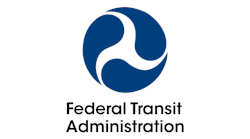- One word to describe yourself: Excited
- Alma Mater: Tufts University
- Fun fact about yourself: I started camping with my family during the pandemic and now we are hooked.
- Favorite station or stop that you have ever visited or frequent (and why): Grand Central Terminal. It was my previous boss’s favorite station. It always made him so happy to be there and it always makes me so happy thinking of it. I love the natural lights, the food options and the market.
- Favorite route you have ever ridden or frequent (and why): I love the MBTA blue line. Clean cars, really reliable service. I loved seeing neighbors there when I lived in East Boston.
Michelle Muhlanger has been a transformative force in the nation’s transportation network for the past 18 years. She began her career in transportation as a mechanical engineer at the Volpe Transportation Systems Center in Cambridge, Mass., where she helped lead the development of the Federal Railroad Administration’s (FRA) new safety standards for passenger railcars.
Muhlanger then joined FRA in 2012 as deputy regional administrator in its Region 1 Office. In this role, Muhlanger led a team of railroad professionals focused on ensuring safety throughout New England, New York and New Jersey, encompassing some of the largest and busiest rail networks in the nation.
Most notably, Muhlanger led FRA’s oversight of Amtrak’s high-profile railroad Infrastructure Renewal Program at Penn Station in New York City. As a result of her leadership and technical engineering expertise, the project was completed on time with no major safety accidents or injuries. Muhlanger also led efforts to support the operationalization of new start railroads and she led the development of a national training program for FRA’s safety inspectors so that they could successfully oversee the implementation of positive train control technology. While at FRA, the U.S. Secretary of Transportation recognized Muhlanger with one of the department’s highest awards for her work leading an interagency team that improved the safety of the Massachusetts Bay Transportation Authority’s (MBTA) Green Line Extension Project.
In 2020, Muhlanger joined the Federal Transit Administration (FTA), where she currently serves as the deputy regional administrator in its Region 1 Office. In this role, Muhlanger provides executive direction over a cross-disciplined team of engineers, community planners, transportation program specialists and administrative professionals who administer and oversee a portfolio of nearly $8 billion in federal investments in the region’s public transportation network. This portfolio includes high profile projects such as MBTA’s $2.3 billion Green Line Extension, which when completed, will provide transit service in communities that historically did not have access to fast and reliable public transit and will significantly reduce vehicle emissions. Mulhanger’s portfolio also includes the Walk Bridge Project on the Northeast Corridor and the newly completed Downtown Transit Connector in Providence, R.I.
Muhlanger has been instrumental throughout the COVID-19 pandemic, particularly overseeing the successful delivery and administration of a $1.1 billion CARES Act program aimed at supporting transit operations in local communities stretching from Maine to Connecticut. To support reaching the White House's goal of getting as many U.S. adults vaccinated as possible by July 4, 2021, Muhlnger facilitated a Peer Exchange on Vaccine Access with New England transit agencies. She also has successfully led her office’s transition to full telework mode.
Muhlanger has continually shattered glass ceilings as a woman engineer and senior-level executive in a field historically dominated by men. She currently is the only woman to serve as an FTA deputy regional administrator and she also is the only female engineer to serve in any deputy role within the agency.
Muhlanger’s success is credited to her strong leadership and interpersonal skills, as well as her drive, focus, political savvy and resilience.
She served as the chair for the Rail Transportation Division American Society of Mechanical Engineers and she serves as a director at large and advisory board member for the Women’s Transportation Seminar.
Is there a specific experience that led you to where you are today?
When I was a junior engineer, a well-respected industry colleague advised me to make sure I have a 40-year career, not a five-year career eight times over. I think he may have meant it as a bit of an insult, that my latest research was not enough of a stretch from my previous work. It took about two years, but I did change my research focus and I also changed my outlook on my career, looking for broader opportunities. Instead of specializing in one area, I really have tried throughout my career to be always learning new things and challenging myself.
What do you enjoy most about your job?
I really enjoy leading and being part of a regional office. It’s the best of both worlds, where we get to work with headquarters and understand how policy is interpreted and implemented, and we also get to work closely with transit agencies and really understand their successes and challenges. I enjoy working with people and a regional office is a great place for that.
What’s the most challenging part of your job?
When I started at FTA, I only worked two weeks in the office before we went to full remote work. I also have two young children and I only started having full childcare coverage this September. It was very difficult to give both my job and the family the attention they deserved. It was really slow for me to both come up to speed in a new job and meet and get to know all my new colleagues and stakeholders.
Accomplishment you’re most proud of and why?
The CARES, CRRSA and ARP Acts allocated nearly $70 billion in federal funding to support the transit industry’s COVID-19 response and recovery efforts. I am proud of how we worked as a regional team to help our grantees so they could access much needed funds to keep their services running during a really difficult time. These transit services have brought essential employees, such as hospital and grocery workers, to their jobs throughout the pandemic and provided transportation to those dependent on transit.
Best advice/tip/best practice to share from your area of expertise?
Don’t shy away from giving bad news or difficult feedback. Prepare yourself for tough conversations and then follow through. If done thoughtfully, a direct conversation, even if contentious, can ultimately strengthen a relationship.




